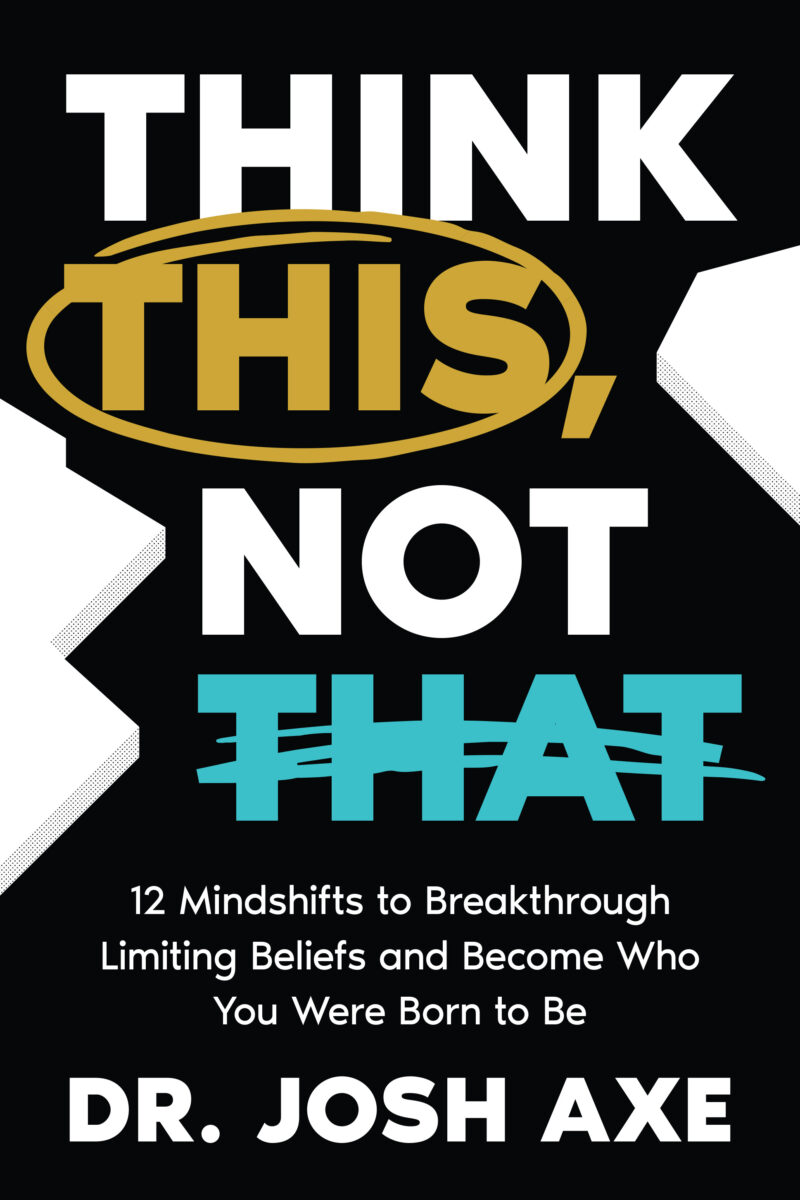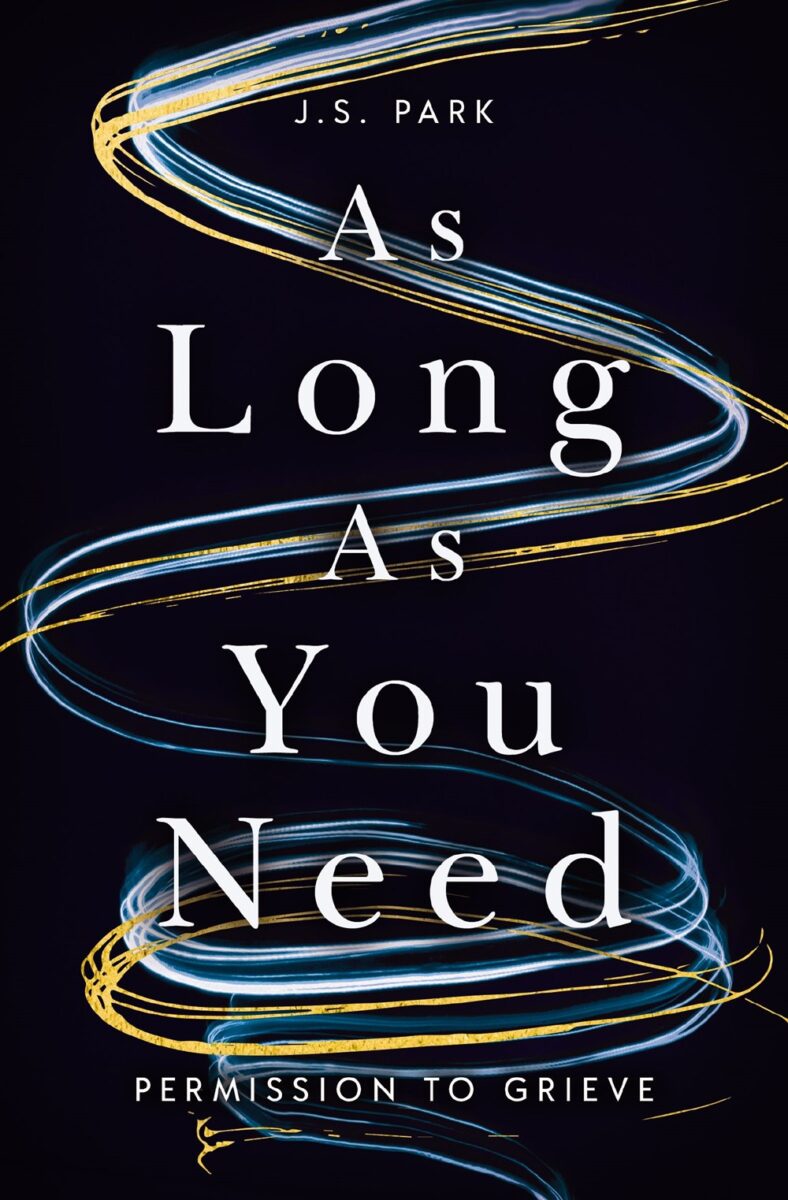Your Pain and Your Story All Make Sense to God: Dr. Josh Axe & J.S. Park
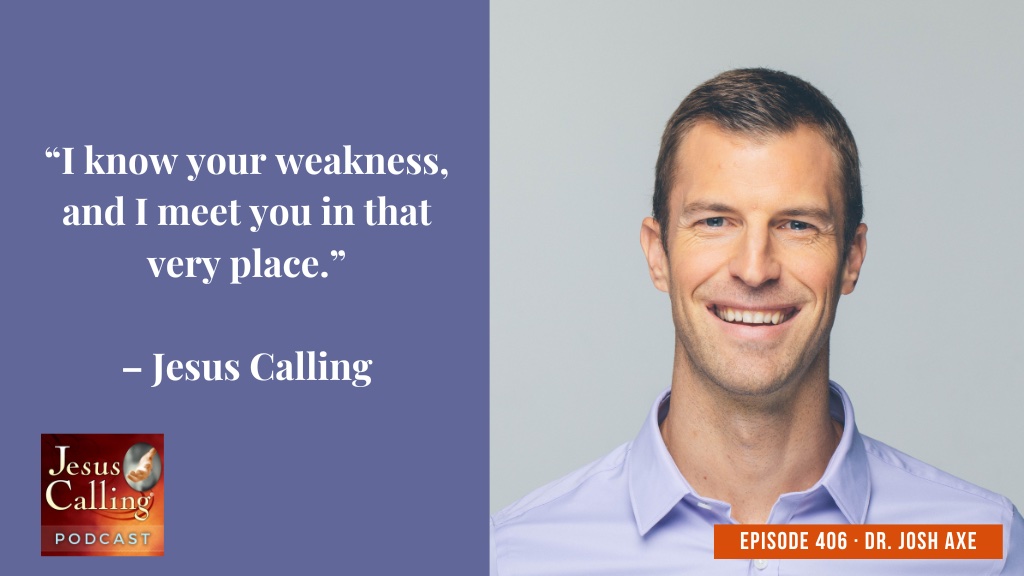
The content in this episode is for informational purposes only, and is not intended to be a substitute for professional medical advice, diagnosis, or treatment. Please consult your physician to see what works best for you.
Dr. Josh Axe: I just would encourage people when you’re going through a hard time in life, maybe you’re battling a health condition—it could be cancer, it could be hyperthyroidism, it could be anything—but press into God. God is more powerful than all of those things, and you just need to spend time believing and knowing God has what’s best for you.
Your Pain and Your Story All Make Sense to God: Dr. Josh Axe & J.S. Park – Episode #406
Narrator: Welcome to the Jesus Calling Podcast. During times of pain, loss, and grief, faith and a close relationship with God can serve as a profound source of comfort, strength, and hope. Prayer, meditation, and the study of scripture can be vital practices in nurturing our spiritual resilience, offering a refuge and a sense of peace. In these ways, our faith acts not only as a beacon of light amidst the shadows, but also as a foundation upon which we can rebuild and heal.
Dr. Josh Axe, a functional medicine doctor, shares his personal health experiences that have shaped his approach to health and wellness. He recounts his mother’s battle with cancer and her successful remission through natural approaches. When Josh had a back injury that turned into a serious infection, his connection to God provided faith and hope that he would make a full recovery. J.S. Park, a hospital chaplain, discusses the importance of being present for people in their most difficult moments and the profound impact of grief support and crisis assistance. J.S. also opens up about his struggle with faith and finding comfort in difficult times.
Let’s begin with Dr. Josh Axe.
Dr. Josh Axe: I’m Dr. Josh Axe. I’m a doctor of functional medicine. I’m the founder of www.draxe.com, the co-founder of Ancient Nutrition and leaders.com, and have a real passion for helping people use food as medicine, mindset medicine, and just grow in body, mind, and spirit.
Turning Pain Into Purpose
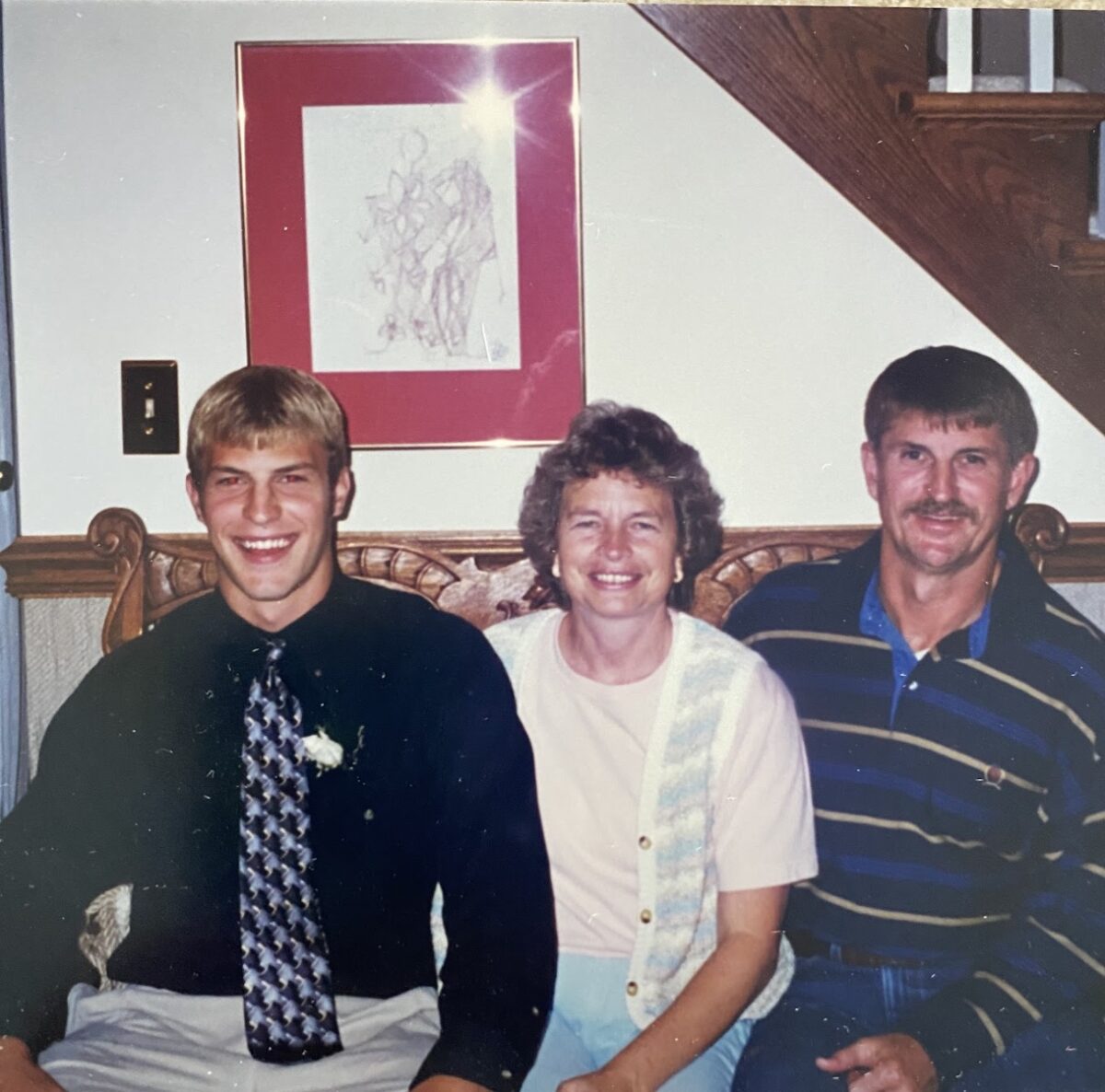
I grew up in a family of faith. Faith was always a really central part of who I was because of my parents. And one of the things that I think really defines a big part of why I became a doctor, and why I have just a real passion for helping people heal, is because of a crisis in my family when I was younger.
My mom was diagnosed with breast cancer at forty-one years old. And we went through all the conventional medical treatments. My mom had a mastectomy. She went through rounds and rounds and rounds of chemotherapy, and I still have memories of her losing her hair and just getting so sick. And there are really two things I thought at that time. I thought, I want to help people like my mom one day. And then another thing was, There has to be a more natural way to help somebody get healthy.
That inspired me to do everything from starting an online website that writes articles, to [creating] a supplement company, to [creating a podcast], YouTube show, and more. One of the things I know that God always does is He can turn pain into purpose. And so that’s been a big story of my family experiencing pain in different ways, but then using that to benefit and love others.
“One of the things I know that God always does is He can turn pain into purpose.” – Dr. Josh Axe
Using Food as Medicine
With natural medicine, when I first started my career, a lot more people questioned it. But now, more and more people are realizing that food is medicine, that mindset is medicine, that lifestyle is medicine. And more people are investing in these natural approaches.
Right when I was about to graduate and open up my functional medicine clinic here in Nashville, Tennessee, I got a call from my mom and she was in tears on the phone. And she says, “Josh, I’ve got bad news. I’ve just been diagnosed with cancer again. What do I do?” And I said, “Mom, what do you want to do? Do you want to do the conventional approach? Do you want to do something more natural?” She said, “I’m feeling led to do the natural approach.” We started doing a lot of vegetables, lots of berries. We did supplements like reishi mushroom and tumeric and did wild caught salmon and some bone broth. So she ate a really, really healthy, nutrient-dense diet.
She also started practicing prayer. She started going to conferences and being prayed for. My mom also realized that she had a lot of emotions that she’d not dealt with. She had a lot of fear in her life, a lot of worry, and she hadn’t really cast those on God. And so she started spending more time in prayer and praise and gratitude.
And we followed this protocol for four months. We went back to her oncologist, they redid a CT scan, and we got a call from them. The first thing they asked us was, “What have you been doing?” And my mom shared with them. And then their exact words were “Hmm, this is highly unusual. We don’t typically see this. The scan has shown that your tumors have shrunk by more than 50%, and we’re astounded. But keep doing what you’re doing. We need to see you again in nine months.” And she went back nine months later in complete remission. And today, my mom is in her mid-seventies and she’s in the best shape of her life.
Learning to Overcome Our Limiting Beliefs
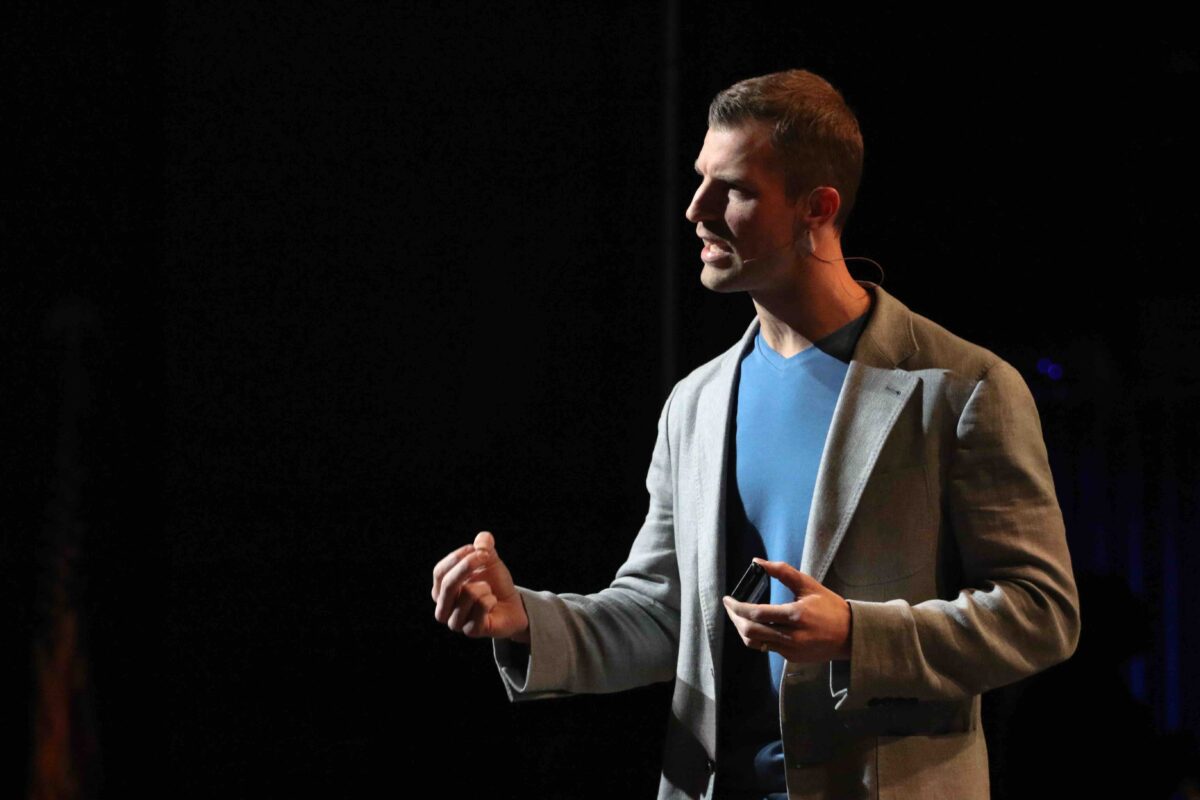
I think there’s a lot of people that have beliefs that are limiting them, and I’ve found that sometimes if people just break through one limiting belief, it can radically change their life.
“I’ve found that sometimes if people just break through one limiting belief, it can radically change their life.” – Dr. Josh Axe
For me, just a couple of years ago, I went through the hardest time of my entire life by far. I had a back injury from lifting weights. I went in for treatment, and got quite a bit better. Three months later, I woke up and I couldn’t walk. The pain was so severe in my spine I could hardly move. We had to call an ambulance.
I met with an infectious disease specialist, and he sat down with me and he said, “Best case scenario, you’re going to have pain the rest of your life, and you are going to be the first person to know when bad weather comes through. Worst case scenario, you’re going to be permanently disabled and have trouble walking.”
For the first time in my life, there were emotions I experienced that I’d never experienced before, I’d never truly felt despair or hopelessness, and I actually felt those for the next twenty-four hours. And then finally I went and I said, “God, I feel like there’s a mountain in front of me and I don’t know what to do.” I just felt the peace of God come over me. And I felt like God said, “Just walk with me and I’ll get you through this.” I realized, too, this mindset I had—because it’s so easy to start going on social media or Google or start searching for spinal infection outcomes.
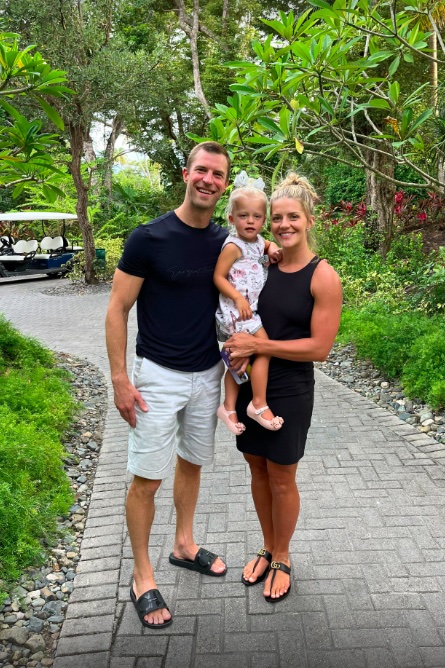
And so I went and I started going through and getting treatment. I got IV antibiotics for four weeks. I got into something called a hyperbaric chamber for two hours a day. I pretty much ate meat and vegetables, and took a lot of good supplements. But I didn’t walk for almost a whole year, and then I was on a walker for two months. But I believed and prayed to God. I said, “God, would you help me not only get my health back, but get me better than I was before?
I can say now it’s a year later and I’m back lifting weights. I’m throwing my daughter in the pool in the air, and I feel great. So if we’re having right and positive thinking, it’s a major, major contributor to us healing and achieving our optimal level of health.
“If we’re having right and positive thinking, it’s a major, major contributor to us healing and achieving our optimal level of health.” – Dr. Josh Axe
Small Habits with Large Benefits
I think there’s some really basic things that people can do to get healthy. Oftentimes, people try to do everything or they work up in their head, Well, to see results, I’m going to have to work out for an hour a day and completely change every last thing, and I just don’t have the time or money for it. The reality is, if people just make small changes, they can radically change their life.
Here’s an example: you don’t have to exercise an hour a day. What if you just went for a walk for twenty minutes a day, which is about one mile? The studies show actually that walking is the number one exercise for longevity. Another example is well, what if you don’t change your whole diet? What if you just changed breakfast? That’s changing one third of your entire diet. Try a superfood smoothie. And it’s very simple, three ingredients: one cup of berries like blueberries, a scoop or two of a collagen protein or a bone broth protein, and then add a little water or coconut or almond milk. If you just started doing that for breakfast, that’s an incredible change.
And then when I’m done with that walk, I come inside. I’ll make myself that smoothie typically, sit down, and then I’ll read my Bible. And then after that, I’ll spend some time in prayer, meditation, just talking to God, listening to God, and thinking about what I read, and maybe what I feel like that still, small voice shared with me what I need to apply to that day. And it sets up my entire day for success. Every morning, I do a spiritual triathlon, so I wake up in the morning and I go for a walk and I say everything I’m grateful for, and I just praise God.
Jesus Listens, October 31st:
Eternal God,
In Your Presence there is fullness of Joy, perfect Peace, and unfailing Love. I delight in walking with You along the path of Life, enjoying Your company each step of the way. Because You are continually by my side, the Joy of Your Presence is always available to me!
You have promised to keep me in perfect Peace as I fix my thoughts on You. Please help me stay in communication with You through my spoken words, thoughts, and songs. When I spend ample time absorbing Your Word—letting it soak into my mind—it changes the way I think and live. As I ponder who You really are, Your Light shines warmly into my heart and blesses me with Peace.
Lord, I want to flourish in Your Presence—like an olive tree flourishing in the house of God. As the sunlight of Your Presence shines upon me, it nourishes me so I can produce fruit in Your Kingdom. And the more I trust in Your unfailing Love, the more I realize how utterly secure I am in You!
In Your bright, loving Name, Jesus,
Amen
Narrator: To learn more about Dr. Josh Axe, check out his latest book Think This, Not That, wherever you buy books.
Stay tuned to J.S. Park’s story after a brief message.
The Joy of Motherhood
Motherhood—it’s a journey like no other, teeming with love, unparalleled dedication, and moments that pierce the very essence of your soul. It’s a trek that demands to be celebrated, lauded, and embraced in its entirety. Celebrate the moms in your life this Mother’s Day with two beautiful gift books, Jesus Calling for Moms by Sarah Young and Grace for the Moment for Moms by Max Lucado. These heartfelt devotionals will remind the moms in your life just how special they are. Jesus Calling for Moms and Grace for the Moment for Moms are available now where books are sold.
Set Your Graduates Up For Success
During times of transition and unknown next steps, it is more important than ever to cling to the promises of God and to tune your ear to hear what Jesus has to say. Jesus Calling for Graduates is an encouraging compilation of 150 devotions from Sarah Young’s brand. Grads will find topics such as discerning God’s will, self-worth, trust, support, and much more. Jesus Calling for Graduates is perfect for both high school and college graduates as they embark on the next chapter. Look for a special custom edition of Jesus Calling for Graduates available exclusively at www.faithgateway.com.
Our next guest is hospital chaplain J.S. Park. Early on in life, Joon subscribed to an atheist mentality, but when he experienced true, unconditional love at a small church, he acknowledged that this love could only come from God. In a desire to give back, he began helping people in their moments of greatest crisis and need by becoming a hospital chaplain where he attends to every emergency with care, comfort, and a listening ear.
J.S. Park: My first name is Joon, online I go by J.S. Park. I am a hospital chaplain. I’ve been a chaplain now for almost nine years, and I work at a level one trauma center with 1,000 plus beds. I do grief support, crisis assistance, end of life care.
An Atheist Changed by Supernatural Love

I grew up an atheist, and I decided that I was an atheist early on because I found out that my parents did not plan on having me. And in my mind, at least in the worldview that I constructed, I thought that since they didn’t plan on having me, I was a haphazard accident. And so I thought, There’s no purpose, there’s no plan, there’s no greater order. There’s nothing divine about my existence.

Around the beginning of college, I found this very small Korean American church and they asked me, “Can you play drums for our praise team?” Because I happened to play drums. And, I asked them, “Is it a problem that I’m an atheist?” And they said, “No.” I started to play drums for them, and in fact, the pastor there and the people there, they were so supernaturally loving that at some point I began to extrapolate backwards and say, “This love, to me, doesn’t make sense. It’s superhuman.” And as I kind of worked my way backwards through it, I said, “There’s a reason for this. I want to know how they love so well.”
And so really, it wasn’t an apologetic argument. It wasn’t something persuasive. There wasn’t one sentence that unlocked some knot in my brain that I suddenly started to believe. It was the love of this small, little church that invited me, despite us believing different things, despite the life that I was living at that time, and just kept loving me. And that’s how I came to understand God and God’s love.
“It was the love of this small, little church that invited me, despite us believing different things, despite the life that I was living at that time, and just kept loving me. And that’s how I came to understand God and God’s love.” – J.S. Park
Filling the Space Between the Sacred and the System
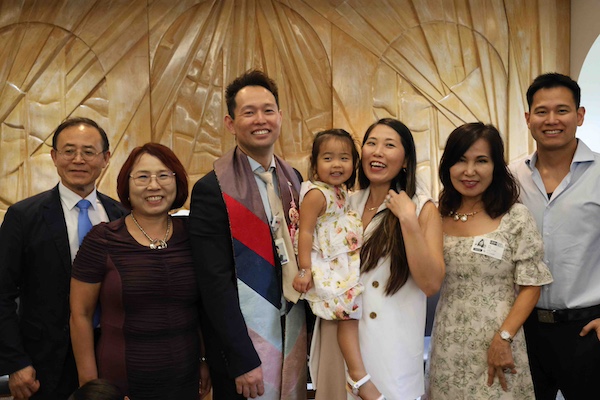
I went to seminary and decided I wanted to be a pastor. But what I found is that being in the pew is very much different than being in the pulpit. And I found it extremely difficult, awkward, and uncomfortable to be in the pulpit.
It takes a very special kind of person to run a ministry, run a church, the fundraising part, the boardroom, the meetings, those kinds of things. I wasn’t good at even deciding the color of the carpet or the paint for the walls. Those were conversations that I didn’t know how to have, but I love being with people. And what I noticed was when there was crisis, when there was somebody in the hospital, somebody went to jail, when there was someone really suffering, when I got the 3:00 AM call from a youth student or college student, “I’m in trouble”—that kind of call—something in my body activated, and I was able to step up and step into that moment. And I thought, Maybe this is where I’m supposed to be.
Chaplains essentially fit the intersection of mental health and faith, and they work as pastors outside of the church. I thought, Maybe this is a great fit. And I got into this program, and then after that, residency at a teaching hospital where I’m still working now.
It’s such a rare thing in life to be in a room where suddenly all the pieces—your experience, your pain, your story, your gifting, your calling, all of it—somehow clicks into place. What a rare and beautiful thing that is.
“It’s such a rare thing in life to be in a room where suddenly all the pieces—your experience, your pain, your story, your gifting, your calling, all of it—somehow clicks into place. What a rare and beautiful thing that is.” – J.S. Park
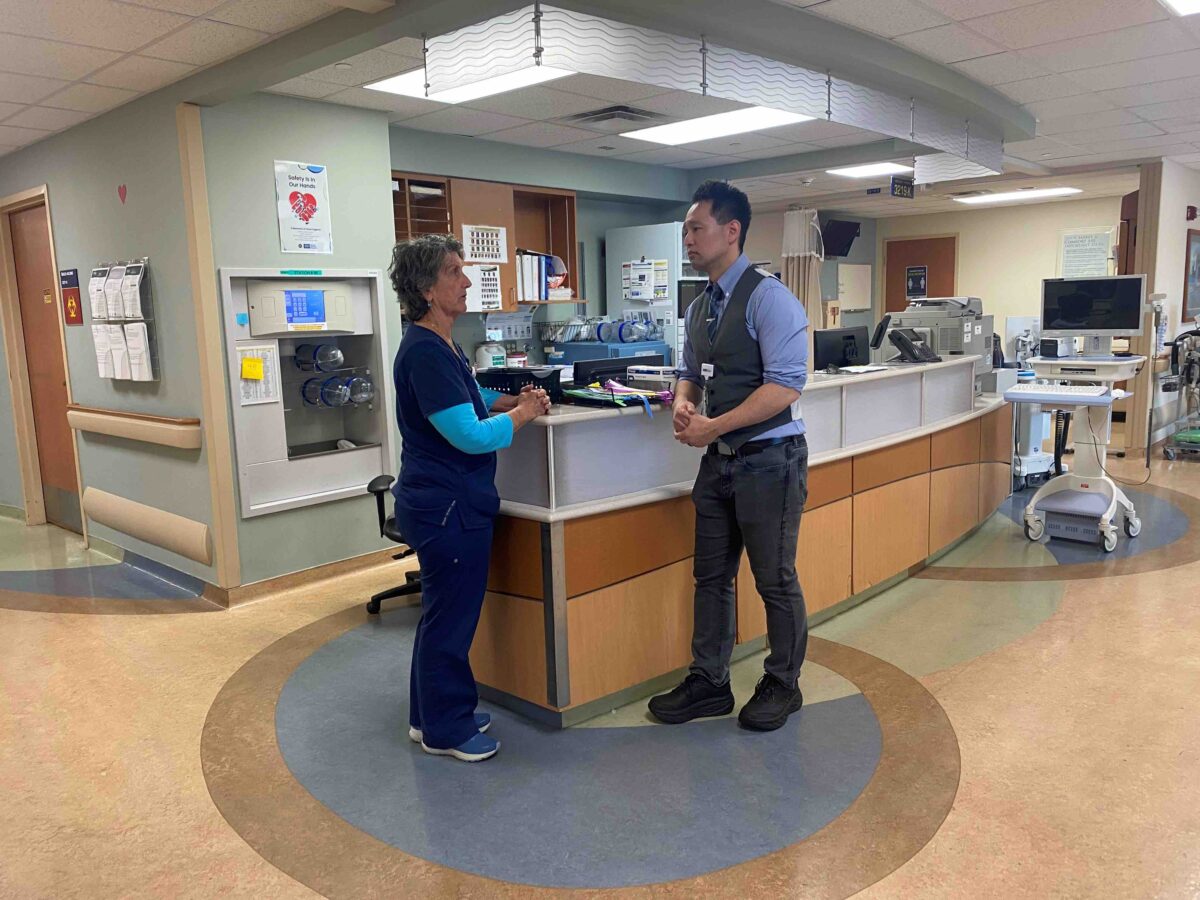
I attend every single trauma that comes into the hospital, and that encompasses car accidents, gunshot wounds, stabbing, fire, falls, stroke. I’m often there and present on the very worst day of my patient’s life. I’m there for support. I reach out to family, I try to connect patients with their families, and I’m often a presence at bedside for anything that the patient needs, whether they want to vent or they need someone there as a witness and a companion. And while there’s a swirl of activity around them, with people coming in and out and asking questions—all of these things that are necessary on that medical level—chaplains fit the space between the sacred and the system, between the medicines and the machines. And so I do my best to be there for anything that my patient needs.
“Chaplains fit the space between the sacred and the system, between the medicines and the machines. And so I do my best to be there for anything that my patient needs.” – J.S. Park

The hardest visits are when we accompany physicians and nurses to break the news to the family that their loved one did not make it. I will often ask the patient’s family as they sit around the deathbed, “What was your loved one like? What were they like in life?” And very often, one by one, the patient’s family will begin to share some specific story or experience or laugh that they had. And then the room becomes filled with tears and these tears tell the story, but also sometimes smiling and laughter as they reminisce and as they remember how much this person meant to them. And that, to me, is a way to honor and lift up and process and remember their story. And it is what our grief needs, for as long as we need.
Hospital Chaplains: The First Line of Human Level Connection
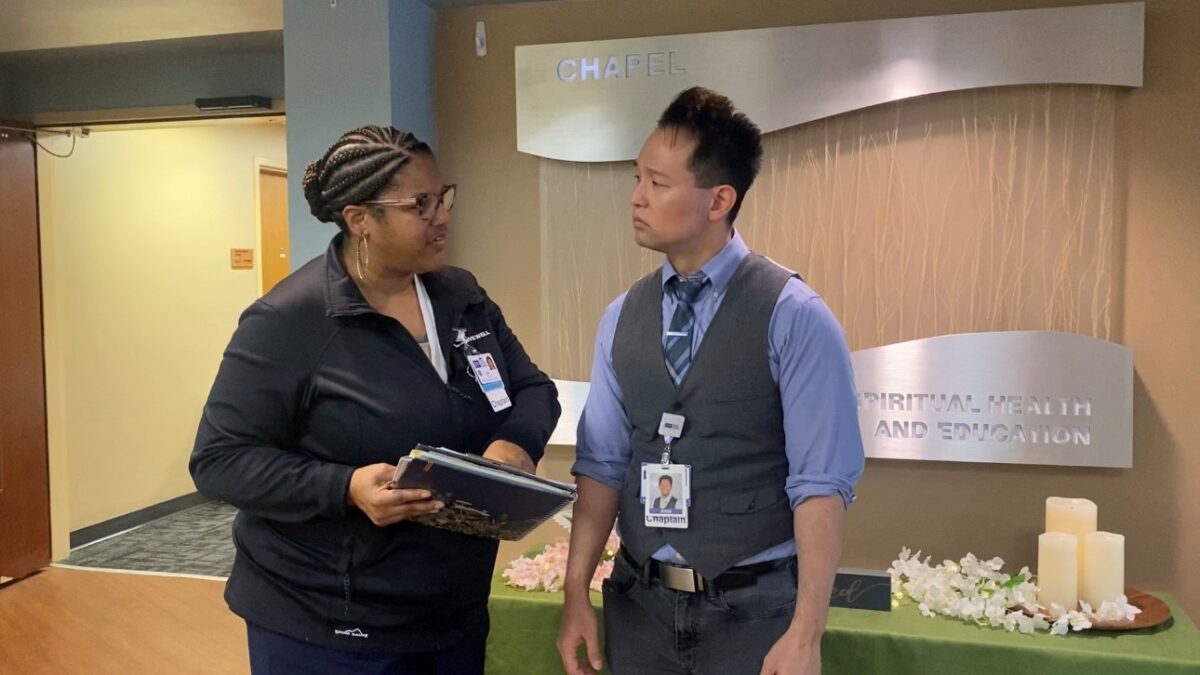
We have so many technical and functional tasks with advanced directives and assisting with end of life decision-making. But more than that, we sit with a patient who is not themselves, maybe not at their best. They can be venting or even violent. They can be angry and outraged, and pain changes people. Pain can turn us into someone, perhaps, that we did not intend to be.
I would say we’re the first in line of sitting with a patient and connecting with them on a human level through the pain, in the pain.
I alter details any time I share about my patients. But there’s one I’ve shared before, where I was on the way to see another patient, and there was somebody in the hallway who was yelling and was obscene and violent and cursing, who wasn’t my patient, but I happened to see him in the hallway. And he was just yelling at everybody passing by. And so I approached him, and I got a little close, and I asked him one question. I said, “Hey, what do you need right now?” And in the middle of yelling, he kind of stopped. And he realized I was pretty close to him, like, trying to connect with him. And he was still sort of escalated, but he said, “What I could really use right now is a hamburger.” I said, “Oh, a hamburger?” And, so I asked him about that, and then he started sharing about how he went to the hospital thinking it’d be something short, but then it turned out to be longer, and he felt like he was in prison. And something about he had had this sort of experience before. He felt like he was locked up and on this tight schedule that he did not want. So as he talked, what I realized was he was angry, he was being violent, those things are not okay, especially if they harm other people. But he was grieving and he perhaps maybe didn’t even know that he needed someone to hear him and to sit in his anger and just to listen to what he needed. So I went to ask the nurse, “Does he have any dietary restrictions?” The nurse said, “No.” So, I said, “Okay, he wants a hamburger. Is it okay if I get him one?” So I went to get him a hamburger and he was okay. It diffused and de-escalated the whole situation.
It reminded me that underneath our anger or our hurt, there’s loneliness. There is a need. There is something specific, and there’s stories underneath stories. So can we pause to take a moment to sit with someone? I think if we paused and offered empathy and compassion, really listen, maybe ask that question, “What do you need right now?” we’d hear their story and be able to connect.
“Can we pause to take a moment to sit with someone? I think if we paused and offered empathy and compassion, really listen, maybe ask that question, ‘What do you need right now?’ we’d hear their story and be able to connect.” – J.S. Park
I wish I was one of those people who could just turn it off when I walk out the door. But I do take it home with me because I’m connecting at that human level. I just wear my emotions on the outside, really. And I think in order to do this sort of role, not just being a provider, but like a whole person with our patients, it does require porous and open vulnerability. Like the thing that makes me a chaplain and makes me a human, I need to and want to keep that open in order to connect.
What I try to remember and remind myself in these rooms is that being present for that person doesn’t fix them. Can’t fix their issue. Can’t cure. Can’t solve. Can’t resolve. But being a loving presence through grief makes the unbearable a little bit more bearable. And me as a chaplain, being a presence there, they are seeing me in some ways as maybe a reflection of or an extension of the Divine, of God. And what I’ve tried to remember is that for me, my faith today is when I suffer, when I hurt, when I see suffering, what we need is loving presence through it. Not to fix, not to solve. Not to answer the existential questions of why, which maybe we’ll have an answer for one day. But what I found is that I don’t want a faith that I need to hold up, but a faith that holds me—not one where I feel like I need to prove that it’s right, but instead rather one that is going to be able to wrap around my questions and continue to hold me. I believe in a Christ who holds us through all of it and who knows what it’s like.
“Being a loving presence through grief makes the unbearable a little bit more bearable…I don’t want a faith that I need to hold up, but a faith that holds me—not one where I feel like I need to prove that it’s right, but instead rather one that is going to be able to wrap around my questions and continue to hold me.” – J.S. Park
The Story of Loss Stays With Us
You know, one of the common things that I hear about grief is, “Here’s how to move on and move forward and let it go. Here’s how to turn the page and find new things and become happy again.”
When we lose someone, it’s devastating. A rift opens up and a person is gone or a dream is gone. We have a loss, and it’s the void of the unreturned. We can’t get back what is gone. And what we look at when we see through Scripture, through culture of old, through ancient traditions, death engagement has always been a part of humanity until recently. And what I mean by death engagement is embracing grief and honoring our dead and living with the dead and carrying them in our hearts and in our every day. And the thing is, in our bodies, grief doesn’t go just because we want it to, or just because we say, “I’m going to let go and move on.” The story of that loss stays in our body, and it is hard to embrace it and to speak about it and to process it and to catalyze it in our bodies. But it’s also much harder not to.
How do I bring that to the surface and tell its story? We all grieve differently, just as we need differently. Some people may appreciate a casserole and may appreciate a check-in and may appreciate you just taking them out spontaneously to bowling or to the movies. But some people may just need a phone call or a text message. Some people may just need a meme or to send them a funny video. The person that you love, you know them. How do we attune ourselves to their needs? Look internally and say, “I don’t need a response from them. I don’t need this to go well. I just want to be available and to offer them things. If they say no or if they reject me, that’s okay. If I don’t get it right this time, that’s okay. I just want to, as best as I can, attune my satellite towards their needs and figure it out and not be offended if they reject me and not stumble too hard if I get it wrong this time, but just keep trying.”
Turning to God for Comfort
For anyone who’s listening right now and is experiencing a hard loss, I know there are no adequate words. I know that there’s not enough to say to console and comfort, but I will just say, heart and spirit are with you, and I know how hard it is. And all your expressions, whether it’s screaming or shouting, that’s prayer and painful expression, or numbness or fatigue or feels like you can’t cry at all… I just validate all of that. I validate all of you.
It’s true that when we are grieving, when we experience loss, our faith gets shaken. We enter a crisis of what we understand, the meaning of the world. Things get completely thrown into disarray. But I think it’s important that when we have the capacity and energy, it’s helpful to reconnect with a point of reference or a baseline or some foothold or anchor to be able to reorient ourselves back to some comfort. Any devotional that helps you to do that, that helps you to connect in a way where you can suddenly reorient yourself, and suddenly you know kind of which way is up and you’re able to find true north—if that’s helpful for you and will help bear you up in this crisis and in this hurt, I will always recommend it. Find the devotional or the writing, or the one author, or the one podcast, or the one preacher that you really like, then cling to that and stick to that and read that over and over and let it permeate through your body and give you the strength and hope that you need, when you are ready.
This is from Jesus Listens, January 28th:
Compassionate Jesus,
Help me remember how safe and secure I am in You.
I’m thankful that even in this world I am never separated from You. For now, though, I must be content with seeing You through eyes of faith. I delight in Your promise to walk with me till the end of time and onward into eternity.
Though Your continual Presence is guaranteed, simply knowing this truth doesn’t automatically change my emotions. When I forget to focus on You, I’m vulnerable to fear, anxiety, loneliness, and other unwanted feelings. Yet I’ve found that awareness of Your Presence with me can dispel those painful feelings and replace them with Your Peace. Please train me in the discipline of walking attentively with You through each day.
In Your calming Name,
Amen
Narrator: To learn more about J.S. Park, follow him on social media, and be sure to check out his new book, As Long As You Need, at your favorite retailer.
If you’d like to hear more stories about pursuing spiritual and physical wellness, check out our interview with Leslie Schilling.
Next week: Stephanie Quayle
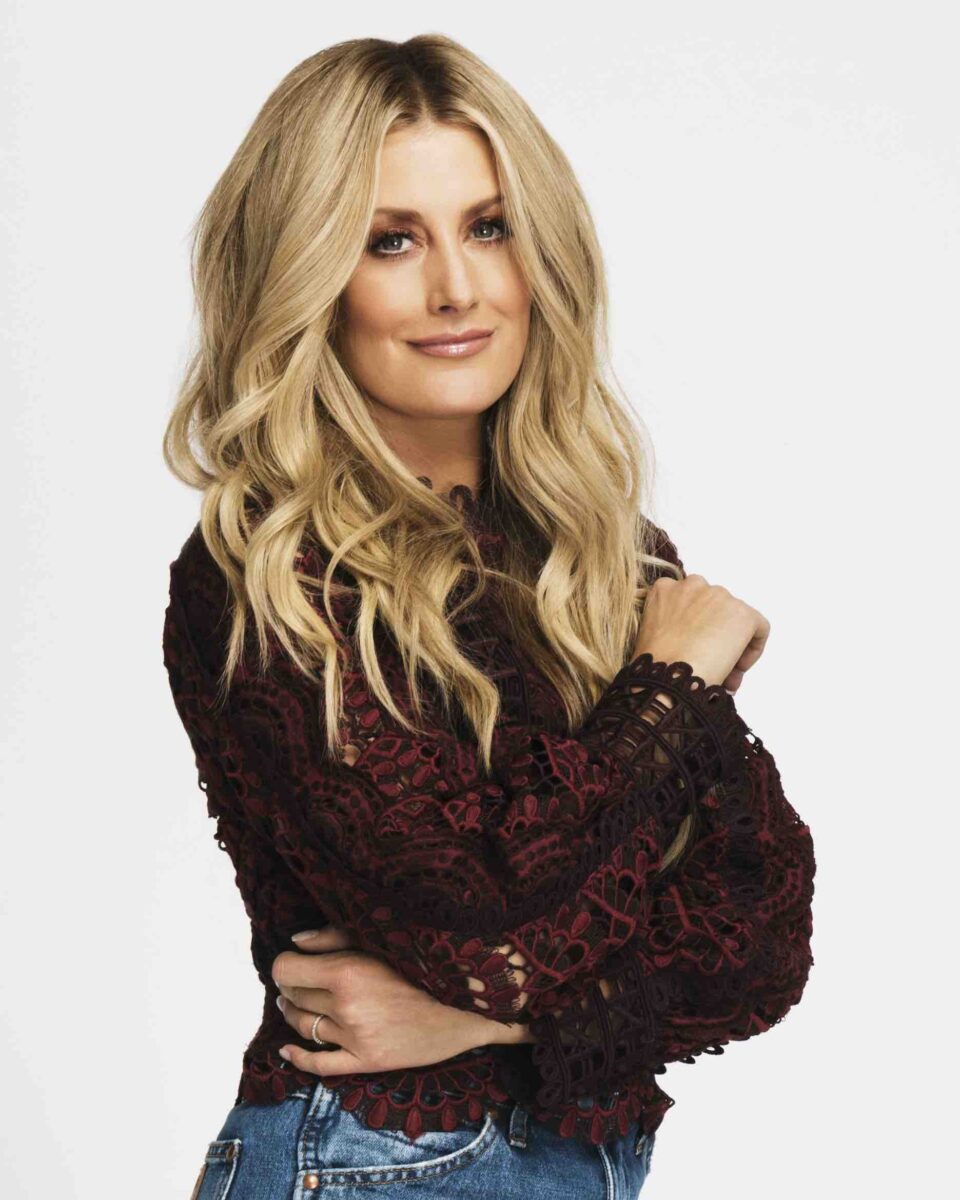
Next time on the Jesus Calling Podcast, we’ll hear from country singer/songwriter Stephanie Quayle, who shares how she survived a toxic relationship, and how she ultimately found healing in forgiveness.
Stephanie Quayle: You only get forgiveness through faith. We have an unconditional, loving God. And that’s kind of a lot to take in because I think for our human brain, it’s hard to fathom a love like that, right?
